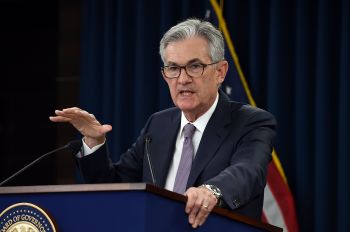Your word for the day: Liquidity
TEXT OF INTERVIEW
Kai Ryssdal: To be fair, the lede story today started yesterday, when the big French bank, BNP Paribas, froze three of its investment funds. As we told you, the European Central Bank pumped $130 billion into the system, trying to take some of the edge off a very nervous banking industry.
The U.S. Federal Reserve followed suit. Overnight and into today, other central banks did the same. The Fed itself has added $38 billion in excess capital just since this morning. In all, the global banking system has gotten a third of a trillion-dollar shot in the arm since last night.
Which brings us to the word of the day: Liquidity. We’ve asked Marketplace’s Bob Moon’s for some help with a definition. Hiya, Bob.
Bob Moon: Hello, Kai.
Ryssdal: So here we have all these reports of the Federal Reserve injecting liquidity into the markets. What does that mean?
Moon: Well, let me answer you with a question here. When we think of money here, what do you think of?
Ryssdal: Uh, cash, coins, checks, cold, hard stuff.
Moon: Yeah, right. When the financial markets deal with money, they prefer to think of it in liquid form. So you’ll notice as we talk about what’s been going on, you’re gonna hear a lot of terms that refer to money in terms of its liquidity, its liquid form.
Ryssdal: That is, its ability to flow from place to place.
Moon: That’s right. So first example here: We’ve been talking for months, even a year or two now, about the flood of investment cash until recently. All you had to do was turn on the spigot, really, and the money flowed. There was so much money flowing, in fact, that the terms to borrow that cash were extremely favorable. Now that many of the banks are going to have to cover their losses from all these subprime defaults, that great reservoir of money has started drying up.
So you turn on the faucet now and the money is down to a trickle. That means a lot of banks that pump that money out to pay for everything — from the mega takeover deals that we’ve been hearing about to just writing a mortgage — are rationing the supply. And just as if it were water or gasoline, when there’s less supply, the cost goes up. And the cost of borrowing money, in this case, is going up. So the Fed has now stepped in to prime the pump, if you will.
Ryssdal: What exactly, though, does that mean? I mean, do they, does Ben Bernanke wake up in the middle of the night and say, “We need to get more money in the market,” and he calls somebody and they open the bank vault?
Moon: Yeah — when your name’s Bernanke, you’ve got your own well to dip into, really, here. That’s why they call it the Federal Reserve.
Follow me on this, if you will. Here’s what’s happened over the past few days. In the normal course of business, all the major banks across the country, when they need quick cash, they regularly borrow from each other. But the subprime mess has caused some of those financial institutions to become greater credit risks themselves. So they find they need to pay higher rates to dip into the cash pool that’s left. The central bank aims to keep that lending rate between banks at 5.25 percent. But at one point in the past 24 hours, there was a report it had gone up as high as 6 percent.
So in comes the Fed, which uses various means to pump more of its own cash out there. And today, the Federal Reserve issued a rare statement that it stands ready to “provide liquidity to facilitate the orderly functioning of the financial markets.” Basically, they’ve told the country’s big banks, “Come use our spigot. We’ll loan you the money, we’ll increase the flow of that cash at the cheaper interest rates that we can offer.”
Ryssdal: Let me hit you with a “What if,” Bob, before I let you go. What if the Fed had done nothing yesterday and today, and just let things ride?
Moon: Well, one more liquidity reference here, Kai. There was real worry the money flow would turn to ice. And that could put a freeze on the whole economy here. You can speculate as well as I can about what that might have meant — the deals stop being made, Wall Street freezes up, it’s not good news. So that’s why they’ve got the back-up pumps running now.
Ryssdal: All right. Marketplace’s senior business correspondent Bob Moon. Thank you, Bob.
Moon: Thanks, Kai.
There’s a lot happening in the world. Through it all, Marketplace is here for you.
You rely on Marketplace to break down the world’s events and tell you how it affects you in a fact-based, approachable way. We rely on your financial support to keep making that possible.
Your donation today powers the independent journalism that you rely on. For just $5/month, you can help sustain Marketplace so we can keep reporting on the things that matter to you.


















